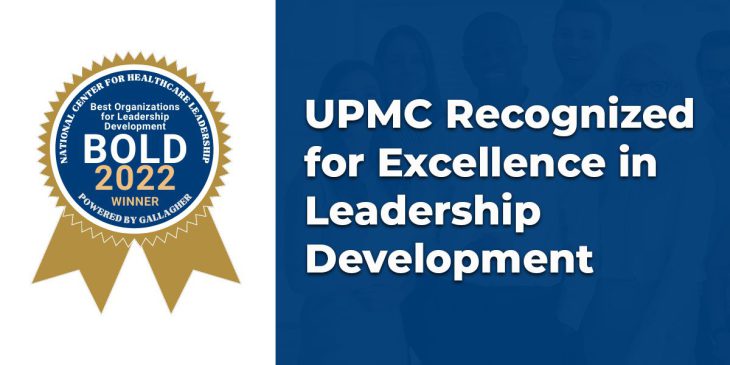The National Center for Healthcare Leadership (NCHL) has selected UPMC as one of seven national winners of the 2022 Best Organizations for Leadership Development (BOLD) Award. UPMC first received this prestigious, biennial recognition in 2020.
BOLD recognition highlights leadership-development practices that are firmly grounded in sound scientific principles and best available evidence for effectiveness that promote leadership development as a critical focus in health care organizations, and that identify, celebrate and disseminate leadership development practices to benefit other health care organizations.
Through UPMC’s commitment to leadership development, strong leaders emerge who create a culture focused on retaining and engaging talented staff.
John Galley, senior vice president and chief human resources officer at UPMC, explained, “Through our employee-engagement surveys, we know that skilled leaders create an environment where employees find meaning in their work, understand their impact, and feel connected to each other and the organization.”
“These leaders are visible and empathetic and find opportunities to grow and nurture their employees. An engaged workforce, in turn, leads to improved patient and customer experiences,” Galley added.
UPMC aligns learning with the organization’s mission, vision, values and strategic goals. Leaders connect and learn from each other, share best practices and apply their learnings to their work and lives. Self-paced, virtual, and live, instructor-led options cater to leaders’ different learning styles, locations, and schedules.
Robust, cohort-based programs provide developmental experiences for specific populations, such as high-potential directors, physician leaders, and health-services leaders. These cohort experiences create a strong sense of shared purpose, aligned leadership behaviors, and personal and professional community.
To compete for the BOLD Award, UPMC submitted its leadership-development strategies and programs through NCHL’s rigorous National Health Leadership Survey, which assesses twelve interdependent dimensions that impact leadership development effectiveness, including: strategic alignment; attracting and selecting; preparing new leaders; talent management and succession planning; developmental experiences; performance feedback; clinical leadership; diversity and inclusion; administrative fellowships; monitoring and achieving results; leadership coaching; and leadership and well-being.









